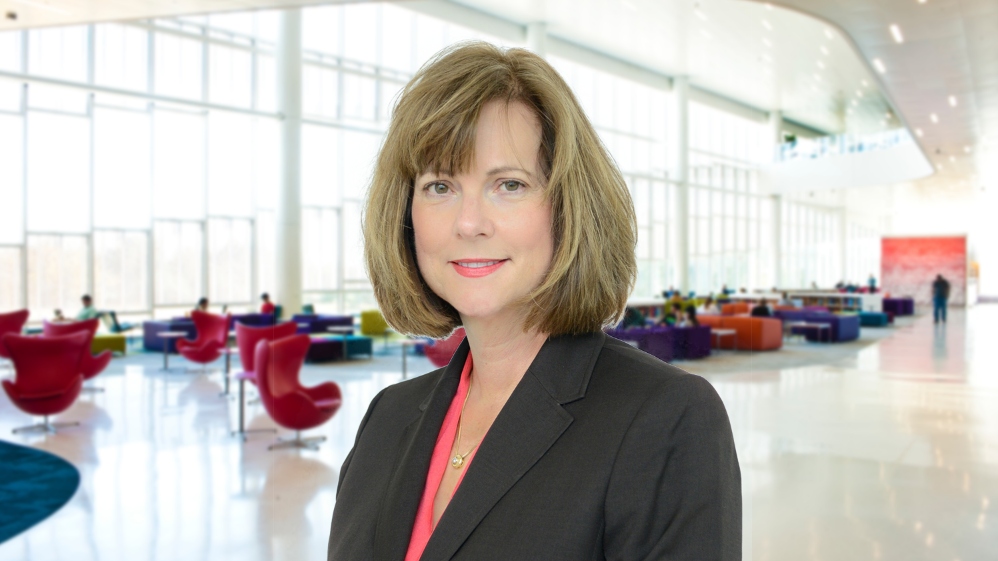Helping Students ‘Think and Do’: Betty Minton

With the SCRC Gallery Walk on the horizon, it’s important to remember the individuals who guide students throughout the semester in preparing their projects for the big event, where they will showcase recommendations and solutions for one of the SCRC’s corporate partners.
Next up in this spotlight series is Betty Minton, a veteran supply chain professional who uses her nearly 30 years of experience to shepherd student practicum teams each semester. In this interview, Minton discusses her time spent as an SCRC Executive Advisor and what she values most about the experience.
Betty Minton
What is your professional background?
I retired from GSK after 29 years in various Supply Chain functions including: Direct and Indirect Procurement, Outsourcing of Contract Manufacturing and Product Divestments, Distribution and Logistics Operations including Import/Export and Customs Compliance in the Americas. Prior to GSK I worked in Direct Procurement for a non-woven textiles firm (The Lutravil Company) and a metal working firm (New Britain Tool).
What has been the highlight of your career?
I had so many opportunities in my career; especially at GSK. The biggest highlight of my career was the opportunity to lead a cross functional team, who after a major merger, rationalized a significant number of LSP’s (Logistics Service Providers) globally to 3. This was in 2000, so we did not have good data and sophisticated tools like we have today. It was a huge and complicated task on a global scale that brought a great deal of value to the company.
Can you describe your role as a practicum project advisor?
I see my role as two fold. It is my role to make sure that students are able to provide a value-added solution to our clients by utilizing a repeatable process for problem solving. I also see it as my role to ensure that students utilize and improve their critical thinking skills, while having the opportunity to learn and enhance skills in good meeting management and effective communication.
How did you hear about the executive advisor opportunity, and what made you decide to share your knowledge and expertise with students?
While at GSK we were a member of the SCRC and I had the opportunity to work with the SCRC student teams on several projects. While I never envisioned a position at the SCRC after retirement, a former GSK colleague was a Practicum Advisor and reached out to me when there was an opportunity. I met with Clyde Crider and [SCRC Executive Director] Dr. Handfield and was fortunate enough to have the opportunity for this role which I have enjoyed tremendously. I have enjoyed my career in supply chain and I really enjoy sharing experiences with such talented and motivated students. It is such a pleasure to have the opportunity to work with students at my alma mater.
Can you give a brief overview of the project(s) you are advising this semester?
I have four teams this semester. One of the teams is tasked with improving a visualization tool for supply chain risks that can be easily populated and modified to accommodate changes and additions to production schedules. Another team is looking to provide the ability to measure performance of multiple stores in a commercial network in a “peer to peer” manner. A third team is analyzing a distribution model for a client by focusing on one region in their network to recommend any improvements that may benefit the entire network. A fourth team is engaged in an optimization of workflows in a warehouse and developing standard work processes with the goal to reduce overtime hours.
What challenges do you often find students facing when working on their projects? What do you advise them to do?
The MBA students often have to juggle various priorities as many are working in full-time careers. This can sometimes bring challenges in finding time to meet with me, their client and their team. Flexibility is really key, as is a good work plan with detailed tasks, timelines, and assigned responsibilities which helps them manage their time better. The undergraduate students often have very little working experience, especially on these types of projects. It is really important for them to learn the fundamentals of time management, process improvement tools and techniques, how to run productive meetings and the importance of taking minutes and assigning actions. Many students struggle with formal presentations, especially when face to face with clients. Feedback and practice is very important in order to develop these skills and gain confidence.
Why would you recommend taking a practicum course to students? What do you think is the most valuable skill or opportunity gained by completing a practicum project?
The practicum is real world experience that students can add to their resumes and work experience . It is a great opportunity to be able to work with such an outstanding group of successful companies. The students gain or enhance skills that will take them to their first role, next role or current role. They have the opportunity to run a project as part of a team, lead meetings and learn processes for problem solving. While the classroom is important, the practicum gives them the hands on experience that is often not available in the classroom. This is especially important for the undergraduates who gain critical skills in the practicum that they can take with them as they graduate and begin their careers. These projects are very typical of what they see in the workplace.
What advice would you offer to students to help them become better candidates for professional positions or graduate school?
Be fearless! Never be afraid to ask questions or push the envelope a little. Develop good communication skills and learn how to be an effective and high performing team member. Get out of your comfort zone and always keep learning throughout your school or business career.
What has been the highlight of your experience as a project advisor?
I really enjoy watching students grow throughout the semester. It is very rewarding to see a student who struggles with a formal presentation at a kickoff meeting increasingly become more comfortable and confident by the final presentation.
In your free time, what do you enjoy doing? Do you have any special skills or talents?
I like to walk my 3 dogs, hike, kayak and play golf. I spend a lot of time on the coast with my husband. I also enjoy water color painting but have a long way to go to be considered “talented!”
Click here to learn more about Betty.
- Categories:


